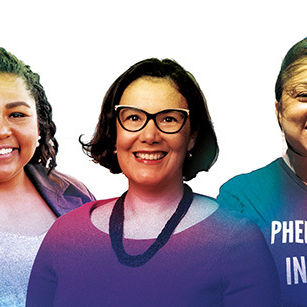Nafisa Fai Is a Groundbreaker, in More Ways Than One

Image: Michael Novak
Growing up in a sprawling Kenyan refugee camp after fleeing war-gripped Somalia, Nafisa Fai remembers clinging to a hope that her family would be resettled somewhere safe, to begin again. During long months of waiting, she learned to crochet, a hobby that stuck. Now, as the first Black female and Muslim refugee ever elected to the Washington County Board of Commissioners, she can be spotted at her new job in her own hand-crocheted hijabs, a reminder of where she’s been, and a can’t-miss-it symbol of who she is now.
“I can’t hide my ethnicity and my race,” she says. “I am a visibly Muslim person. I wear a hijab on my head. I ran on a progressive platform to bring lived experience (to bear).”
To outsiders, Fai’s election might have merited a double take; Washington County, after all, is the clubby, placid-seeming home to Nike, Intel, PGA Tour–level golf courses, and cul-de-sacs aplenty. But over the past two decades, with its population increasing, the county has become the metro area’s most diverse and has moved further to the left, helping to cement Oregon’s perch among the deep blue states.
Fai faced off in the general election against a more conservative, white, male opponent who warned voters she would bring a Portland-like perspective to Washington County, to its detriment.
“The fact that I haven’t been speaking English all my life was used against me. The fact that I wasn’t born here was used against me. The fact that I come from poverty was used against me,” she says. “It has always seemed like you have to have so much money to run for office. [I thought,] how am I going to raise money? I don’t have a single rich friend.”
She learned, she says, even a $5 donation was a win, especially when it came from the county’s tight-knit refugee community, which dug deep for her, phone- and text-banked, and ultimately, turned out to vote in high numbers.
During those months of phone-banking, there were voters who would hear Fai’s name and suggest she should “return to her own country,” says Lamar Wise, local coordinator for the AFSCME Council 75 union and a cofounder of Washington County Ignite, a nonprofit that supports emerging progressives there.
Ultimately, Fai captured nearly 58 percent of the vote. Wise says her public health background fit the moment: she started her career as a lab tech at the American Red Cross before jumping to the Multnomah County Health Department and most recently managed contact tracing programs in Washington County. “As we go into the phase of vaccines being rolled out and how resources will be distributed, the logistics, I think her experience will shine,” Wise says.
The candidate also had some friends in high places, like Oregon Labor Commissioner Val Hoyle, who championed Fai throughout her campaign (and recalls bucking her up at low points, telling her to cry it out, yes, and then go call more voters).
“Because of her experiences, she has very clear values, understands what her positions are, and is able to communicate them in a way that other people can hear her,” says Hoyle.
In office, Fai has pledged to focus on affordable housing—a former public housing resident herself, she’s a firm believer in the transformative power of owning your own home. The mother of three children under the age of 5, including one born during her campaign, she says she’s looking forward to “normalizing” motherhood in politics and encouraging more civic participation by parents and kids alike. Among them, she says, could be kids like she was back in Kenya, in between homes, dreaming of their turn.
“BIPOC communities have every right to be part of this political leadership,” she says. “We have a right to represent our community, to show the power of diversity. There is nothing scary about representation. There is power in it."











